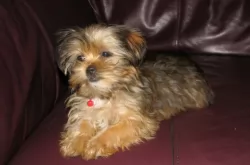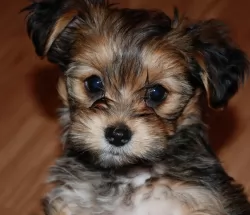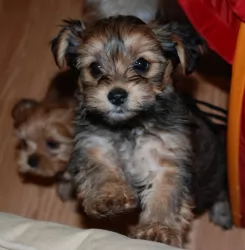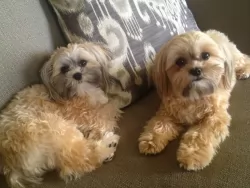 MyDogBreeds
MyDogBreeds Shorkie is originated from United States but Curly Coated Retriever is originated from United Kingdom. Shorkie may grow 45 cm / 17 inches shorter than Curly Coated Retriever. Shorkie may weigh 33 kg / 72 pounds lesser than Curly Coated Retriever. Both Shorkie and Curly Coated Retriever has almost same life span. Shorkie may have less litter size than Curly Coated Retriever. Shorkie requires Moderate maintenance. But Curly Coated Retriever requires Low maintenance
Shorkie is originated from United States but Curly Coated Retriever is originated from United Kingdom. Shorkie may grow 45 cm / 17 inches shorter than Curly Coated Retriever. Shorkie may weigh 33 kg / 72 pounds lesser than Curly Coated Retriever. Both Shorkie and Curly Coated Retriever has almost same life span. Shorkie may have less litter size than Curly Coated Retriever. Shorkie requires Moderate maintenance. But Curly Coated Retriever requires Low maintenance
 The Shorkie is a mix between a Yorkshire Terrier and a Shih Tzu. This little dog actually thinks he’s quite big. He is a great watchdog and a barker, and he is a loyal and loving member of his family. He will let you know if he thinks something is going on that shouldn’t be.
The Shorkie is a mix between a Yorkshire Terrier and a Shih Tzu. This little dog actually thinks he’s quite big. He is a great watchdog and a barker, and he is a loyal and loving member of his family. He will let you know if he thinks something is going on that shouldn’t be.
This hybrid combines two breeds known for their good looks, cuteness and personalities. Shorkies get their watchdog instincts and their loyalty to their people from the Shih Tzu and their personalities and good looks from the Yorkie. This designer breed has no known standard and every puppy is different, but traits from its founding breeds will remain. Both breeds have great personalities.
Regardless of the differences within the litter, because the personalities and adorableness of the two founding breeds are equal, all of the puppies will have those characteristics. They will all be energetic, playful and think they are big dogs. They will all love people and especially kids – playing and watching over them.
The Shorkie is intelligent, trainable, and snuggly. They will also have the stubborn trait that the two founding breeds can show at times. Developed in the United States, this crossbreed is extremely popular even though they have been in existence for only ten years or so. Breeders in the U.S. began to mix these two breeds in order to develop a cute, friendly and intelligent little dog that will cuddle on your lap – perfect lap dog.
Even if we already have breeds similar to the Shorkie, its development allows breeders to diversify and improve the genetics of the dogs. It is important that these be responsible breeders whose intentions are not financial but to legitimately improve the positive traits of each breed while sorting out the undesirable or weak traits. This is the positive side of the new designer breeds.
Even though it is still being developed, at least the Shorkie seems to be a success story for designer breeds as a loving, popular little dog. It will take a lot more time and a lot more development before the Shorkie becomes an actual recognized breed. At the moment it remains a hybrid, a crossbreed, a so called designer dog.
It will be at least 7-10 generations of careful and quality breeding before the Shorkies are potentially recognized as its own pedigree breed. It is important to breed Shorkies to Shorkies in order to develop a standard that could be accepted for a new breed by the AKC and UKC. Over time the puppies must become more and more standardized in their conformity to that new breed standard. Their physical appearance and their temperament will be standardized. At this stage the second generation of Shorkies is rare. Their popularity is rising in the United Kingdom. Both Britain and Ireland have a growing interest in this hybrid.
 There isn’t much on the origin of the Curly-Coated Retriever and his history hasn’t been well documented.
There isn’t much on the origin of the Curly-Coated Retriever and his history hasn’t been well documented.
The dog originated some time ago in the early 19th century, with some believing that the dog was in England during the late 1700s already.
It is thought that this dog, which is identical to the Labrador but with a tight, curly coat, descended from the Old English Water Dog, the Irish Water Spaniel and the smaller Newfoundland. This mix was later crossed with the Poodle and this is where the curls come into the picture.
The Curly-Coated Retriever gained substantial recognition in England during the mid-1800s and exported to the United States in 1907. The dog was also later exported to Australia and New Zealand and has been recognized by the American Kennel Club in 1924.
 The Shorkie, being a cross between the Yorkshire Terrier and the Shih Tzu, and as such has physical and temperament characteristics from both breeds. They could be 50-50 but most likely each puppy will be more like one of the founding parents than the other. Because there is a lot of similarity between the founding breeds there is a lot of similarity between the Shorkies.
The Shorkie, being a cross between the Yorkshire Terrier and the Shih Tzu, and as such has physical and temperament characteristics from both breeds. They could be 50-50 but most likely each puppy will be more like one of the founding parents than the other. Because there is a lot of similarity between the founding breeds there is a lot of similarity between the Shorkies.
Their hair is either wavy or straight, but it is soft. It can be a wide variety of colors and usually they have a darker mask on the face. Usually they have the eyes of the Shih Tzu – large -but not protruding. Their muzzle is short, and the skull is round with triangle ears. Their bodies are compact, small with plenty of muscle for their size. They also have fine bones and short legs, with a thin curled tail.
 The Curly Coated Retriever is a medium sized dog standing at about 58–69cm and weighing anything between 25 – 40kg. The dog, mainly black or chocolate brown, is active and muscled and was used for hunting and retrieving waterfowl.
The Curly Coated Retriever is a medium sized dog standing at about 58–69cm and weighing anything between 25 – 40kg. The dog, mainly black or chocolate brown, is active and muscled and was used for hunting and retrieving waterfowl.
The coat has small, tight curls over the body except for the face and the legs. He has floppy ears and they eyes of the black dog are brown while in the liver-colored dogs, the eyes are amber or gold.
The tail is long. He has a wedge shaped head, and its the fact that the face is more long than wide which makes him easily distinguishable from other retriever breeds. Of course, it is the curly coat which is the dog’s most distinguishing feature.
The Curly Coated Retriever has been used as a gun dog, and today, like most retrievers, they make superb pets and are a lively, social and fun-loving breed. He becomes loyal and devoted to his human family members, making a splendid pet, but then he must be exercised.
Have him trained and socialized and he becomes an obedient, relaxed dog, eager to please. He is intelligent and self-confident and gets on well with children in the home as well as with other pets.
He fits in easily to city and country life, but if he could have large grounds to run, play and swim, which he loves, he would be at his happiest.
 Curly Coated Retrievers are such fun dogs, full of personality, robust and active. He makes such a wonderful pet and is loving, loyal and protective. He is brave, courageous, independent and confident as well. He gets on well with children and loves to be part of all their games. He is capable of getting on well with other animals in the home.
Curly Coated Retrievers are such fun dogs, full of personality, robust and active. He makes such a wonderful pet and is loving, loyal and protective. He is brave, courageous, independent and confident as well. He gets on well with children and loves to be part of all their games. He is capable of getting on well with other animals in the home.
He is an active dog and won’t fit in well with those who like to sit around all day. He wants to be active, and then loves to settle down with his human family at night. He is an excellent all-rounder and makes a loving, loyal pet.
 Many hybrids are in better health at least genetically than their parent breeds. Responsible breeders will breed any genetic issues out of their puppies. Still there are many health issues that the Shorkies are prone to. These include:
Many hybrids are in better health at least genetically than their parent breeds. Responsible breeders will breed any genetic issues out of their puppies. Still there are many health issues that the Shorkies are prone to. These include:
• Brachycephalic Airway Syndrome – “smashed face” causes problems with breathing, heat, flying and more.
• Glaucoma – Yorkshires have this, and it can be secondary to the lens Luxation.
 With good care, the average life expectancy of the Curly-Coated Retriever can reach between 10 and 12 years. However, there are some health concerns that your dog may have to contend with and which are common in most other dog breeds too.
With good care, the average life expectancy of the Curly-Coated Retriever can reach between 10 and 12 years. However, there are some health concerns that your dog may have to contend with and which are common in most other dog breeds too.
Apart from hip dysplasia, bloat, dental decay and eye diseases such as cataracts, ear infections are a common canine health problem, particular when your dog has floppy ears and loves the water.
Ear infections can also be caused because of bacteria, ear mites, allergies and hair growth in the ear canal. Your pet will shake his head, maybe off balance and be scratching his ear. You might notice his ears are red and oozing. Get him to the vet immediately.
When you brush your dog, check for fleas and ticks. Worms too, can make your dog ill, and can actually be the death of a puppy. Worms can cause weight loss, a rough, dull coat and a generally run-down appearance. Your vet will be able to guide you as to what medications are available.
 1.Feeding the puppy - The Shorkies need a high-quality, well-balanced dry kibble. Make sure it is a formula for small, active dogs. It should have lean meat and essential minerals and vitamins. Make sure it is puppy food not adult. The puppy needs 300 -550 calories a day in 3 meals.
1.Feeding the puppy - The Shorkies need a high-quality, well-balanced dry kibble. Make sure it is a formula for small, active dogs. It should have lean meat and essential minerals and vitamins. Make sure it is puppy food not adult. The puppy needs 300 -550 calories a day in 3 meals.
2.Feeding the adult – Obesity is a problem for the Shorkie as it is for many small dogs. Don’t overfeed your adult but give her the same kind of high quality small breed dog food, only for adults. They need about 200-300 calories a day in 2 meals.
4. Games and Exercises – These are very active little dogs and need exercise every day. They needs walks, games, and time with you. They also love to cuddle with you at the end of the day. They love squeaky toys and playing fetch outside or inside.
 The Curly Coated Retriever is a single-coated dog breed and this makes him a low maintenance dog. He doesn’t shed much and a good brush twice a week will keep the curly coat in good condition. There are some dog owners that trim the feathering around the legs, feet, tail and belly.
The Curly Coated Retriever is a single-coated dog breed and this makes him a low maintenance dog. He doesn’t shed much and a good brush twice a week will keep the curly coat in good condition. There are some dog owners that trim the feathering around the legs, feet, tail and belly.
The Curly Coated Retriever is an attractively low maintenance breed. Therefore he doesn’t require any special diet. He does well on a top quality manufactured dog food where protein is listed at the top.
These dogs are inclined to put on weight easily so you want to be sure to follow the directions on the packaging and not overfeed him. With his kibble, sometimes add in some cooked brown rice, vegetables and chicken.
Raw meat can be expensive but if you can, try and include it into your pet’s diet to avoid nasty skin rashes and allergies. Always make sure that cool, fresh water is available to your dog and make sure the food and water bowls are regularly washed.